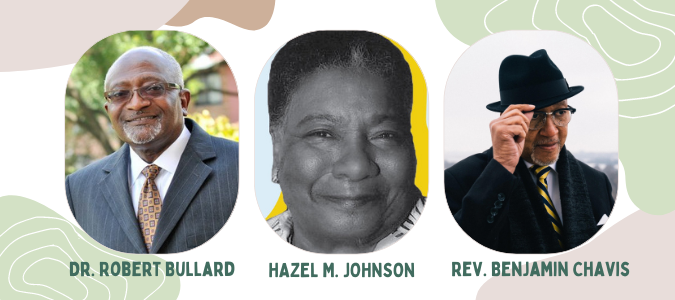Celebrating Black History Month
February is Black History Month, and we want to celebrate and honor the rich history, contributions, and triumphs of past & present Black environmentalists.
The environmental justice movement is rooted in Black History. Black leaders, who are often overlooked, shaped the modern environmental movement we know today, and we owe gratitude for their considerable efforts and sacrifices to bring the not-so-radical assertion that all people, regardless of income, race, nationality, citizenship, and ability deserve access to clean air, water, unpolluted land, green space, and opportunity to the mainstream.
Here are three notable leaders:
Dr. Robert Bullard, who is known as the Father of the Environmental Justice movement, is an activist, award-winning author, and scholar of sociology whose landmark research brought to light the fact that hazardous waste sites and polluters disproportionately expose low-income and communities of color to the brunt of environmental risks, leading to higher incidences of cancer, asthma, and more. Dr. Bullard was also an instrumental leader in drafting the 17 Principles of Environmental Justice that continue to guide environmental justice work today. Additionally, he is an award-winning author, the Distinguished Professor of Urban Planning and Environmental Policy + Director of the Bullard Center for Environmental and Climate Justice, the co-founder of the HBCU Climate Change Consortium, and a proud U.S. Marine Corps veteran.
Hazel M. Johnson, who is known as the Mother of the Environmental Justice movement, was a champion of public housing and holding polluters accountable in the Southeast Side of Chicago. In the early 1970s, after her husband passed from lung cancer and several of her children developed respiratory illnesses, Johnson discovered her community of Altgeld Gardens had the highest rate of cancer in Chicago due to environmental hazards. In response, Hazel M. Johnson created People for Community Recovery and through considerable life-long advocacy work, secured protections for her community and beyond from exposure to toxic waste, notably playing an important role in the signing of President Clinton's Environmental Justice Executive Order.
Civil rights leader, Rev. Benjamin Chavis, led the UCC for Racial Justice to publish the report Toxic Wastes and Race in the United States in 1987 that revealed that race was the most significant factor in the location of hazardous waste sites. The report, which came after Rev. Chavis kick-started the protest of the state of North Carolina's decision to dump 40,000 cubic yards of contaminated soil in a poor Black farming community in Warren County, was one of the first of its kind to illustrate the urgency for environmental justice.
Celebrating today’s Black climate leaders!
The legacy of Black environmentalists championing protections for our communities continues today right here in Massachusetts.
Rev. Mariama White-Hammond is the Chief of Environment, Energy, and Open Space for the City of Boston and the founding pastor of New Roots AME Church in Dorchester. Rev. White-Hammond utilizes an intersectional lens to connect ecology, immigration, climate change, energy policy, and economic justice to build equitable and just communities in Boston and beyond. Rev. White-Hammond’s commitment to ensuring all residents have access to clean air, clean water, and sustainable neighborhoods is commendable. White-Hammond has already made strides in working to mitigate extreme heat, expand access to healthy, culturally appropriate foods through community gardens, and create green jobs for the next generation of leaders. Under her guidance, we look forward to seeing Boston steered to a healthier, sustainable future for all.
Sen. Lydia Edwards is a climate leader with big, bold ideas for creating a greener world. As a Boston City Councilor, Lydia Edwards made waves; from fighting for environmental justice for all residents, to securing renewed protection for our vital wetlands, to pressing investment in green energy solutions, and stepping up to preserve and expand open space, Lydia Edwards has made considerable progress to building a better future for Boston. Her successes are big: she voted to support climate resilience investments in Boston’s park systems, protecting both nature and neighborhoods, and supported a Wetlands Protection Ordinance to preserve critical environmental areas. She has also fought to expand water transportation, prevent highway expansion and mitigate the impacts of airport pollution. Now, as a State Senator for the 3rd Suffolk District, we are excited to have a powerful ally in preparing our state for climate change.
Kalila Barnett is a Senior Program Officer for Climate Resilience with the Barr Foundation. In that role, she guides and supports numerous organizations in the Boston area (including CRWA) to ensure their work is impactful, strategic, and centers equity. She feels passionate about the need to create space to talk about climate change in practical ways that can build the political will necessary for transformational change. “Communities of color and lower-income communities are most negatively impacted by the fossil fuel economy and are bearing the worst burdens of the climate crisis. In order to have a strong and powerful climate movement, their needs have to be centered. ” Previous to Barr, Kalila served as Executive Director at Alternatives for Community and Environment (ACE), an environmental justice organization, where she worked to frame environmental issues in terms of human impact, the built environment, and climate justice, and before that, was a Senior Organizer at Community Labor United.
Rev. Vernon K. Walker is the Senior Program Manager at Communities Responding to Extreme Weather (CREW) and a member of our Board of Advisors. With a wealth of experience from theological study, community engagement, and social work, Rev. Vernon Walker is transforming the meaning of equitable climate preparedness engagement with CREW. In building climate resilience hubs for local, hands-on education, creating networks of mutual aid and resource sharing to serve communities, and partnering with organizations and municipalities to adapt to climate change, under Rev. Walker’s leadership CREW is building long-term community resilience and advancing constructive solutions for our warming world.
We would like to celebrate two of CRWA's own who exemplify Black excellence & leadership
By day, Board Vice President Lance Campbell serves as a Senior Project Manager for the Boston Planning & Development Agency. In his spare time in addition to helping lead CRWA, Lance is an award-winning youth track coach who was recently inducted into the Massachusetts State Track Coaches Association Hall of Fame. Here is Lance with his son Myles, a Walpole High School track star!
CRWA Board Member Matthew Jasmin is a Senior Civil Engineer with Howard Stein Hudson, Adjunct Professor with UMass Lowell, a Captain in the US Air Force, and a member of the Town of Dedham Open Space Committee.
We are so grateful to Lance and Matt for their time, expertise, and commitment to ensuring we build a clean, climate-resilient Charles River for future generations.
We would also like to uplift the work of several organizations that are making strides to ensure we achieve equity in our watershed.
And, we ask that you support their work:
Alternatives for Communities and Environment (ACE) is a Roxbury-based non-profit striving for environmental justice, ending displacement, transit equity, and youth empowerment across the state of Massachusetts. With twenty-five years of monumental community organizing efforts, ACE is a leader in ensuring communities of color and low-income communities have access to affordable housing, clean energy options, green transit, and freedom from environmental hazards. Notably, ACE is also leading Transit Equity Month this February!
Our partner Communities Responding to Extreme Weather (CREW) is a leader in helping to prepare communities for extreme weather and climate impacts in an equitable and just way. CREW is a network of local leaders building grassroots climate resilience through inclusive and hands-on education, service, and planning to equip communities with resources and capacity to prepare for climate impacts. Led by Rev. Vernon K. Walker, CRWA partners with CREW to expand our reach to communities across the watershed, especially across language and accessibility barriers so we can ensure meaningful engagement with all of our residents.
X-Cel Conservation Corps is a youth empowerment organization that aims to make high school completion, post-secondary study, and sustainable career paths more accessible to underserved communities in Greater Boston, by providing flexible, customized instruction and career readiness development at no cost in convenient community locations. We partner with X-Cel to address the unequal representation of people of color in the environmental field by training the next generation of stormwater professionals in our Green Infrastructure (GI) Ambassador program. In 2021 we trained 18 XCC members, with some going on to get their Wastewater Operator License and look forward to upcoming trainings in 2022.
Finally, we invite you to continue learning about the history of the Environmental Justice movement and present-day environmental writing and research with several book recommendations by Black authors from our staff:
Program Associate for Climate Resilience Dira Johanif recommends Undrowned: Black Feminist Lessons from Marine Mammals by Alexis Pauline Gumbs. Alexis Pauline Gumbs is a Queer Black Troublemaker. All of her work is grounded in a community-building ethic, aiming to facilitate unstoppable ancestral love in practice. Her book Undrowned is a series of meditations based on relevant lessons from the marine mammal world. It highlights lessons we as a community and individual can learn from whales and dolphins, with an incredible intro and perspective of Black history and the ocean.
Climate Resilience Specialist Robert Kearns recommends People Before Highways by Dr. Karilyn Crockett. Dr. Karilyn Crockett, who serves as Greater Boston Chamber of Commerce’s Research & Program Consultant and holds a Ph.D. from the American Studies program at Yale University, a Master of Science in Geography from London School of Economics, and a Master of Arts and Religion from Yale Divinity School, tells the stories of a multiracial coalition of urban and suburban residents of greater Boston who successfully organized a movement of protests and political organizing that stopped the construction of the Southwest Expressway (I-95) and the Inner Belt (I-695) in Boston. As a complement to the book, Robert recommends the short documentary Equal or Better: The Story of the Silver Line about the broken promises of moving the elevated Orange Line that originally went above Washington Street to Roxbury’s Nubian Square to the Southwest Corridor in Jamaica Plain.
Fieldwork coordinator Andrew Salant recommends Orleans by Sherri L. Smith, a very relevant story regarding disease and the perspective of a society that is gravely impacted by climate change. After a string of devastating hurricanes and a severe outbreak of Delta Fever, the Gulf Coast has been quarantined. Years later, residents of the Outer States are under the assumption that life in the Delta is all but extinct…but in reality, a new primitive society has been born. Fen de la Guerre is living with the O-positive blood tribe in the Delta when they are ambushed. Left with her tribe leader’s newborn, Fen is determined to get the baby to a better life over the wall before her blood becomes tainted. Fen soon meets Daniel, a scientist from the Outer States who has snuck into the Delta illegally. Navigating the Orleans wilderness, they form an unlikely bond and, in the end, maybe each other’s last hope for survival.
Communications Manager Julia Hopkins recommends the holy-trinity of environmental justice research and writing by Dorceta E. Taylor; The Rise of the American Conservation Movement: Power, Privilege, and Environmental Protection, The Environment and the People in American Cities, and Toxic Communities: Environmental Racism, Industrial Pollution, and Residential Mobility. Dorceta E. Taylor is a scholar, award-winning sociologist, and author of the landmark national report, the State of Diversity in Environmental Institutions, and her three influential books present how conservation ideas and politics are tied to social dynamics such as racism, classism, and gender discrimination, how racial and socio-economic dimensions of exposure to environmental hazards in the U.S, and the history of environmental inequality and urban environmental activism.
Additionally, explore Boston Public Library’s “Black Is…” Reading List and the Black Climate Week Reading List from the Solutions Project.




